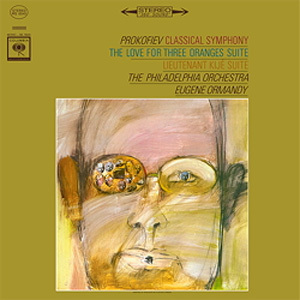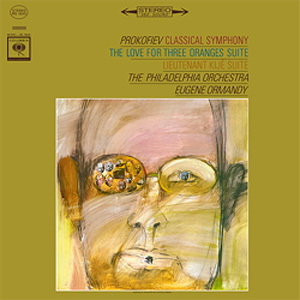Speakers Corner / Columbia - MS 6545 - 180 Gram Virgin Vinyl
AAA 100% Analogue - Limited Edition - Audiophile Mastering
Pressed at Pallas - MS 6545 Columbia Masterworks
This Speakers Corner LP was remastered using pure analogue components only, from the master tapes through to the cutting head 20 Years pure Analogue
Serge Prokofiev - Symphony No. 1 in D major ("Classical" Symphony), op. 25; Suite from "Lieutenant Kijé", op. 60; Suite from "The Love For Three Oranges", op. 33 - The Philadelphia Orchestra | Eugene Ormandy
Sergei Prokofiev was a real expert when it came to writing short musical works with brilliant orchestration. His Op. 25, the "Classical" Symphony is not only his shortest and best known, but also the most humorous with its genial emulation of the style of Papa Haydn. The leaps and jumps, the courtly gestures and turbulent last dance flirt with the familiar style of the always slightly cool Modern music.
Another entertaining and creative work is his "Lieutenant Kijé" Suite, which was originally written as film music for a satirical novella about tsarist bureaucracy. The opera "The Love for Three Oranges" is also full of irony and wit. In the story, the advocates of Tragedy, Comedy, Lyric Drama and Farce argue about how to present their own plays. How the Ridicules win the competition with their story of the love for three oranges is presented in highly imaginative musical gems, which tell of princesses, fools and magicians and culminate in everyone praising the Prince and his bride. All these characters are brought vividly to life by Eugene Ormandy and his highly competent Philadelphia Orchestra – a treat for the ears and the inner eye.
This Speakers Corner LP was remastered using pure analogue components only, from the master tapes through to the cutting head.
Musicians:
The Philadelphia Orchestra
Eugene Ormandy, conductor
Selections:
Sergei Prokofiev (1891-1953)
Classical Symphony
The Love For Three Oranges Suite
Lieutenant Kije Suite
Recorded March 1961, December 1962, and February 1963 in Town Hall and Athletic Club, Philadelphia, PA.

20 Years pure Analogue
This Speakers Corner LP was remastered using pure analogue components only, from the master tapes through to the cutting head 20 Years pure Analogue
Are your records completely analogue?
Yes! This we guarantee!
As a matter of principle, only analogue masters are used, and the necessary cutting delay is also analogue. All our cutting engineers use only Neumann cutting consoles, and these too are analogue. The only exception is where a recording has been made – either partly or entirely – using digital technology, but we do not have such items in our catalogue at the present time
Are your records cut from the original masters?
In our re-releases it is our aim to faithfully reproduce the original intentions of the musicians and recording engineers which, however, could not be realised at the time due to technical limitations. Faithfulness to the original is our top priority, not the interpretation of the original: there is no such thing as a “Speakers Corner Sound”. Naturally, the best results are obtained when the original master is used. Therefore we always try to locate these and use them for cutting. Should this not be possible, – because the original tape is defective or has disappeared, for example – we do accept a first-generation copy. But this remains an absolute exception for us.
Who cuts the records?
In order to obtain the most faithful reproduction of the original, we have the lacquers cut on the spot, by engineers who, on the whole, have been dealing with such tapes for many years. Some are even cut by the very same engineer who cut the original lacquers of the first release. Over the years the following engineers have been and still are working for us: Tony Hawkins, Willem Makkee, Kevin Gray, Maarten de Boer, Scott Hull, and Ray Staff, to name but a few.
At the beginning of the ‘90s, in the early days of audiophile vinyl re-releases, the reissue policy was fairly straightforward. Companies such as DCC Compact Classics, Mobile Fidelity, Classic Records and others, including of course Speakers Corner, all maintained a mutual, unwritten code of ethics: we would manufacture records sourced only from analogue tapes.
Vinyl’s newfound popularity has led many other companies to jump on the bandwagon in the hope of securing a corner of the market. Very often they are not so ethical and use every imaginable source from which to master: CDs, LPs, digital files and even MP3s.
Even some who do use an analogue tape source employ a digital delay line, a misguided ’80s and ‘90s digital technology that replaces the analogue preview head originally used to “tell” the cutter head in advance what was about to happen musically, so it could adjust the groove “pitch” (the distance between the grooves) to make room for wide dynamic swings and large low frequency excursions. Over time analogue preview heads became more rare and thus expensive.
So while the low bit rate (less resolution than a 16 bit CD) digital delay line is less expensive and easier to use than an analogue “preview head”, its use, ironically, results in lacquers cut from the low bit rate digital signal instead of from the analogue source!
Speakers Corner wishes to make clear that it produces lacquers using only original master tapes and an entirely analogue cutting system. New metal stampers used to press records are produced from that lacquer. The only exceptions are when existing metal parts are superior to new ones that might be cut, which includes our release of “Elvis is Back”, which was cut by Stan Ricker or several titles from our Philips Classics series, where were cut in the 1990s using original master tapes by Willem Makkee at the Emil Berliner Studios. In those cases we used only the original “mother” to produce new stampers.
In addition, we admit to having one digital recording in our catalogue: Alan Parsons’ “Eye in the Sky”, which was recorded digitally but mixed to analogue tape that we used to cut lacquers.
In closing, we want to insure our loyal customers that, with but a few exceptions as noted, our releases are “AAA”— analogue tape, an all analogue cutting system, and newly cut lacquers.
60 Years Pallas
Audiophile Vinyl - Made in Germany For over 60 years the family business in the third generation of the special personal service and quality "Made by Pallas" is known worldwide. Our custom PVC formulation produces consistently high pressing quality with the lowest surface noise in the industry. Our PVC complies with 2015 European environmental standards and does not contain toxic materials such as Lead, Cadmium or Toluene. Our vinyl is both audiophile and eco-grade!










